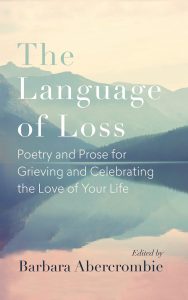
by Barbara Abercrombie, author of The Language of Loss: Poetry and Prose for Grieving and Celebrating the Love of Your Life
My husband wasn’t very interested in poetry. He never read it and didn’t see how it connected to his life. Then one day I read him Mary Oliver’s “The Summer Day” with its famous last lines, Tell me, what is it you plan to do/ With your one wild and precious life? When I finished reading, I saw he had tears in his eyes.
Later I got us tickets to a poetry reading Mary Oliver was giving at UCLA. My husband was amazed that Royce Hall was packed, every seat filled. “She’s just going to stand up there and read her poems?” he asked me. The excitement level was akin to a rock concert. And like a rock concert, when she began to read, her fans nodded and lip synced, applauding their favorite lines written by this modest, understated woman in her seventies, who, yes, just stood up there and read her poems. Vanity Fair later compared Oliver’s stage presence to Madonna but without the backup dancers. “She dazzled,” wrote Nell Scovell.
Seven years later one of my daughters read “The Summer Day” at my husband’s memorial service. My other daughter read Naomi Shihab Nye’s “Kindness” – Before you know kindness as the deepest thing inside,/ you must know sorrow as the other deepest thing –
In the months after my husband died, all I could read was poetry. I couldn’t concentrate on prose, but I needed the bones and breath of language to anchor me in this world. I wanted to read deep, I wanted to read something that cut to the chase. Grief isn’t linear and neither is poetry – the leaps of language, the metaphors, the heart race of something so true your breath catches. The swerves and sharp turns of good poetry felt like the path I was on through grief. I needed to fill up my soul, but I didn’t want soft or sentimental. I wanted truth. And I wanted to read poets who had also lost a spouse or a partner and could make meaning out of the grief I was feeling. I wanted company.
And now during the dark, strange days of the summer of 2020 I’m reading a lot of poems again. Poetry fits the times. Garrison Keillor wrote in the preface to his anthology Good Poems for Hard Times that poetry is for people in a jam. And aren’t we all in a jam right now? Just the tension of walking down streets keeping six feet away from each other, the masks, the angry politics – can poems lessen the tension, draw us closer to one another, give some meaning to this chaos? Or maybe poetry we love can simply draw us deeper into what’s really meaningful in life, make us sit up and pay attention to it.
The famous line about loving each other from W.H. Auden’s poem “September 1, 1939” keeps running through my head: We must love one another or die. Eighty years later that line reverberates more than ever.
In a new anthology of poetry on the subject of the pandemic, Together in a Sudden Strangeness, Julia Alvarez writes a poem entitled “How Will This Pandemic Affect Poetry?” and in it she asks, Will the lines be six feet apart?...(Will) (each) (word) (have) (to) (be) (masked) (?) At the end she asks, What if only poetry will see us through?
In the same anthology, Ron Koertge writes in “Elder Care” about the 60’s music playing in a market during the senior shopping hour. Shoppers looking like robbers in our masks and gloves. We sway above our sturdy shoes. And then with their carts they inch closer, smiling in case somebody even under the circumstances wants to forget/why we’re here and dance.
Last week I joined a Zoom group at a church streaming a discussion of the intersection of poetry and theology, and learned about Lectio Divina – an ancient Catholic prayer practice for reading scripture. Using this method in the Zoom meeting for a poem, the leader read the poem four times, and four times we listened to it, looking for different ways to connect with it. Reading, meditation, prayer, contemplation.
The poem was “Wild Geese” by Mary Oliver. With its evocative lines addressed directly to the reader much like she did in “The Summer Day”: Tell me about despair, yours, and I will tell you mine, the poem elicited a conversation in the Zoom meeting about the important questions in life, especially now. What to do about the loneliness we feel? Where is home, where do we belong?
In the New Yorker in 2019, Rachel Syme wrote that Oliver’s poems were not about isolation, but “about pushing beyond your own sense of emotional quarantine even, when you feel fear.” She wrote this over a year ago, and now in the pandemic we’re struggling with physical as well as emotional quarantine. The silence and stillness required to read poetry, the solace of reading poets who put into language the complicated contradictions of existence, the ideas and hard questions that good poetry confronts us with might just see us through.
Where is home? Where do you belong? What do you intend to do with these wild and precious days?
Barbara Abercrombie has published over fifteen books, including The Language of Loss. Two of her books were listed on Poets & Writers Magazine’s “Best Writing Books of the Year” list. Her personal essays have appeared in many national publications and anthologies. She has received the Outstanding Instructor and Distinguished Instructor Awards from UCLA Extension, where she teaches creative writing. She lives in Pasadena, CA with her rescue dogs Nelson and Nina. Find out more about her work at www.barbaraabercrombie.com.
